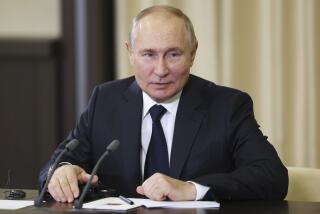Moscow’s China Move Is Bold Sweep : Consequences of Overtures Could Reach to Europe, Japan
- Share via
In the decade since the death of Mao Tse-tung, Soviet-Chinese relations have gradually improved, but the process has been excruciatingly slow. Now a major breakthrough may be at hand. Paradoxically, its cause and greatest effect may be found in Soviet policy toward Europe and Japan.
According to conventional wisdom, the current difficulties can be traced to three actions by the Soviet Union: its invasion of Afghanistan, its support for the Vietnamese invasion of Cambodia, and its large military presence on its eastern border. In addition, the border line itself has been in dispute, with the Chinese claiming that it runs down the main channel of the Amur and Ussuri rivers, and the Soviets saying that it runs along the river banks on the Chinese side.
Lately the Soviet Union has made some moves that have little practical meaning but that must be welcome gestures in Peking. One was Moscow’s announcement of a small troop reduction in Afghanistan. The other was the Politburo’s support for Truong Chinh, who is pro-Chinese, as the general secretary in Vietnam.
The real concessions have been made on the border question. First, Moscow has publicly agreed to the Chinese definition of the river boundary. If there are no catches, this would give China a number of islands that were the scenes of bloody battles in the past. The Amur has already been reopened to commercial traffic.
The Soviets also have announced talks with Mongolia toward reducing the Soviet troop strength on that border, and have proposed a major mutual reduction of troops along the Soviet-Chinese border.
Finally, the Soviets have agreed to resume the construction of a railroad from Soviet Central Asia to the Chinese province of Sinkiang that had been stopped in the early 1960s.
The Chinese are reacting coolly in public to these proposals, emphasizing the necessity for progress on the Cambodian issue. However, they are accepting the economic openings, and the border concession is a powerful incentive to reach an agreement on the troop issue.
The significance of these moves is not limited to Soviet-Chinese relations. First, Soviet concessions on the river boundary removed the major obstacle to giving several disputed offshore islands to Japan. The Soviets had feared that such a gift would cause China to harden its demands for disputed river territory. Now Soviet diplomacy with Japan is becoming extremely active.
And the timing of the Soviets’ moves reaffirms the seriousness of their courtship of Europe. The Chinese had announced a reduction of 1 million troops some time ago. The Soviets were remarkably slow in responding, probably because they were uncertain about where to relocate troops involved in a border pull-back. A shift of large numbers to the West would frighten Europe; if they were demobilized before negotiations with Europe, the Soviet Union would seem weak.
The Soviets’ proposal in June for a mutual reduction of 100,000 to 200,000 troops in Europe in the next year or so, and a total of 500,000 by the early 1990s, enabled Moscow to make the subsequent troop-reduction offer to Peking. If an agreement is reached, the Soviets could safely demobilize troops, which would facilitate an agreement with Europe.
The Soviet Union seems very serious about troop reductions in Europe. It is mobilizing the anti-nuclear movement behind the issue by drawing a lesson from Chernobyl: Conventional shells and bombs falling on 150 nuclear-power stations in Europe would produce an unimaginable catastrophe. This month the Soviet delegate at the Stockholm conference reemphasized Soviet willingness to permit inspection of troop reductions, and this may have real meaning.
The Soviet Union and China still have many conflicting interests and views, and they are unlikely ever to become close allies again. But only a person guided by hopes rather than by the evidence would believe that nothing is changing in Soviet policy.
What does this mean for the United States? The instinctive American reaction is to fear a Soviet-Chinese rapprochement, assuming that China keeps Soviet troops tied down. In reality China is too weak to do this. In the case of war in Europe the Soviet Union would simply shift the troops on the Far East border to the West. Our interest should be in a partial rapprochement that would permit reduction in the overall size of the Soviet army.
In any case we should not kid ourselves. If the Soviet Union is making serious offers to Europe, Japan and China, we face a real challenge.
More to Read
Sign up for Essential California
The most important California stories and recommendations in your inbox every morning.
You may occasionally receive promotional content from the Los Angeles Times.













